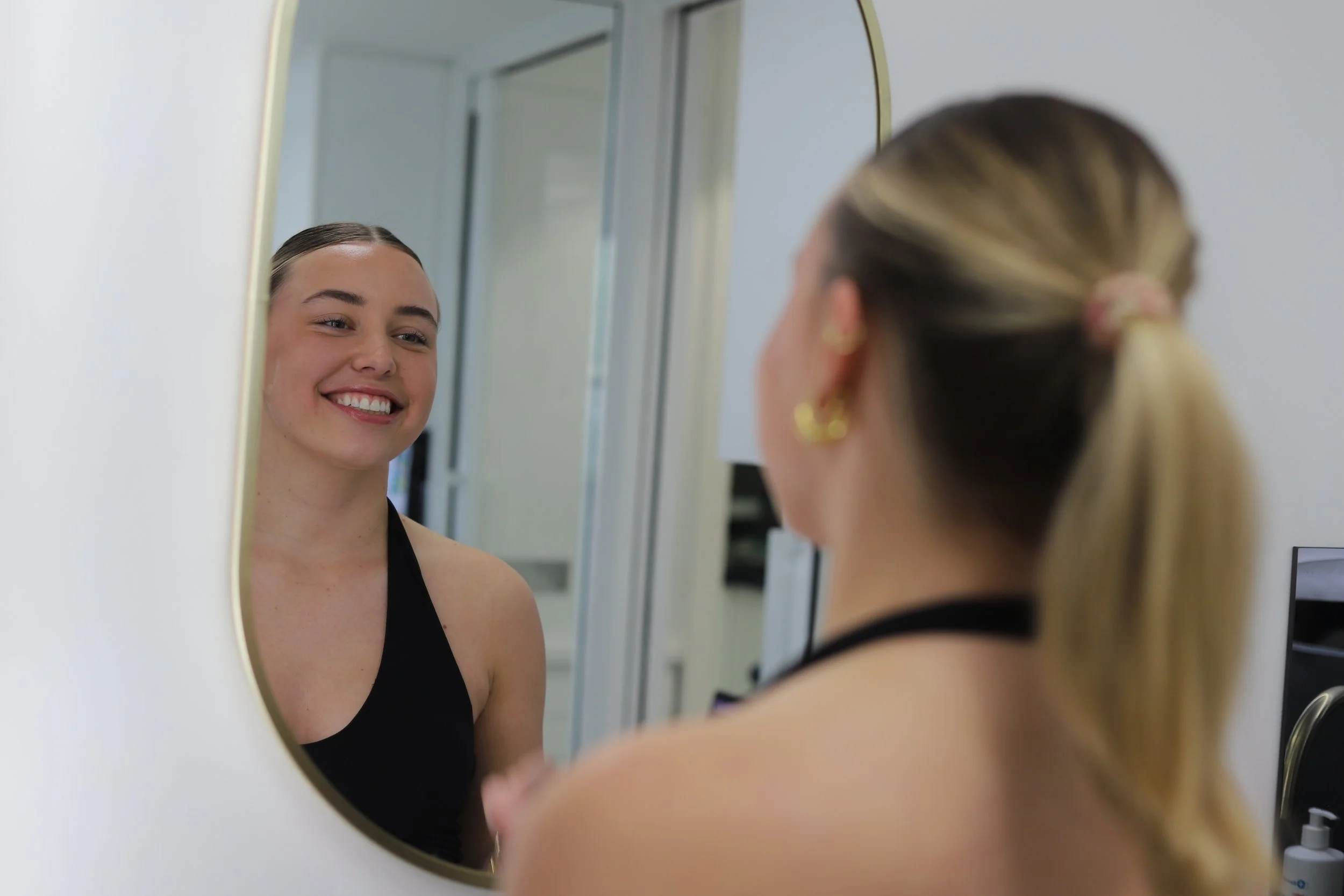
Flawless Smiles with Expertly Created Composite Resin Veneers
At Brisbane Smile Boutique
Composite Resin Veneers in Brisbane.
Affordable, Customised Solutions for a Stunning Smile.
Composite resin veneers are made from a tooth-coloured resin material, expertly shaped and polished by our skilled Aesthetic Dentists to blend seamlessly with your natural teeth.
Using this minimally invasive technique, you can achieve a beautiful, transformed smile with a quick and cost-effective treatment
Transform your smile, minimally and naturally.
-
These veneers can conceal:
Crooked or uneven teeth
Stains and discolouration
Chips, cracks, or worn edges
Minor alignment concerns
Unlike crowns, composite veneers are more conservative, preserving your natural tooth structure. They’re ideal for healthy teeth needing aesthetic refinements, particularly in young patients or those seeking a cost-effective solution.
-
After thorough cleaning, the teeth are prepared. A bonding agent is applied, followed by layers of composite resin sculpted directly onto your tooth and cured with a special light. Anaesthesia is rarely required and most patients return to normal activities immediately. The polishing process takes at least 30 minutes for a glossy mirror like finish.
-
Composite veneers typically last 4 to 7 years and can be repaired or replaced as needed. With good oral hygiene and habits, their lifespan may be extended. Avoid chewing hard objects like pens or ice to prevent chipping.
-
Composite resin is not as strong as porcelain
It may chip with habits like nail biting
Staining can occur over time
-
Each composite veneer costs $900. The procedure generally takes about 1 hour per tooth. Your dentist will refine the shape and shade to suit your smile goals. While more affordable than porcelain, composite bonding has limitations which your dentist will help you understand.
-
Minimally invasive approach
More affordable than porcelain
Completed in a single appointment
Easily repairable and adjustable
Immediate results with natural aesthetics
-
Shorter lifespan (5–7 years)
Greater potential for staining
Requires more upkeep
Can wear or chip more easily
Less suited for major dental corrections
FAQs
-
No, getting composite veneers is generally pain-free. The procedure is minimally invasive and usually doesn’t require any drilling or anaesthetic. Some patients might experience mild sensitivity during or shortly after treatment, but this typically settles quickly. Your dentist will ensure your comfort throughout the process.
-
No, composite veneers cannot be whitened like natural teeth because the resin material does not respond to whitening treatments. If your veneers become stained or discoloured over time, your dentist can polish or replace them to restore their appearance. To maintain your veneers, it’s best to avoid staining foods and drinks and practice good oral hygiene.
-
Composite resin veneers typically last between 5 to 7 years, depending on factors like oral hygiene, lifestyle habits, and regular dental care. Over time, they may show signs of wear, staining, or minor damage. With proper maintenance and routine check-ups at Brisbane Smile Boutique, your veneers can stay looking great and be repaired or replaced as needed to keep your smile fresh.
-
To keep your composite resin veneers looking their best, it’s important to:
Maintain excellent oral hygiene by brushing twice daily and flossing regularly
Avoid biting hard objects or using your teeth as tools to prevent chipping
Limit consumption of staining foods and drinks like coffee, tea, and red wine
Attend regular dental check-ups and professional cleans for polishing and monitoring
Consider wearing a night guard if you grind or clench your teeth to protect your veneers
Following these steps will help extend the life of your veneers and keep your smile bright.
Brisbane Smile Boutique has been redefining Dentistry since 2003.
With a Lifetime of trusted Expertise, our Aesthetic Dentists offer expertise in General and Aesthetic Dentistry, creating Exceptional Smiles with Precision, Artistry, and Care.
Connect directly with the Brisbane Smile Boutique Team.
If you could perfect one element of your Smile, what would it be?
Our Dedicated Aesthetic Team at Brisbane Smile Boutique are here to Understand your Vision and would love to assist.
AESTHETIC DENTISTRY TREATMENTS
PORCELAIN VENEERS
Brisbane Smile Boutique offers premium porcelain veneers designed to enhance your smile with natural looking, long lasting results. Custom crafted to suit your facial features and aesthetic goals, our veneers correct chips, gaps, discolouration, and uneven teeth. Achieve the confident, flawless smile you’ve always wanted with expert care and precision.
SMILE DESIGN
Discover the power of personalised Smile Design at Brisbane Smile Boutique, where your dream smile begins with expert planning and artistry. Simply upload a photo of your smile and explore customised treatment options tailored to your unique features and goals. Book your complimentary consultation today and take the first step toward the confident, radiant smile you deserve.
INVISALIGN®
Achieve a straighter, healthier Smile with Invisalign—clear, comfortable, and custom made. Use our interactive Smile Simulator to explore how aligners can transform your smile and correct bite issues before treatment even begins. Start your journey today with a personalised consultation and see the difference Invisalign can make.











